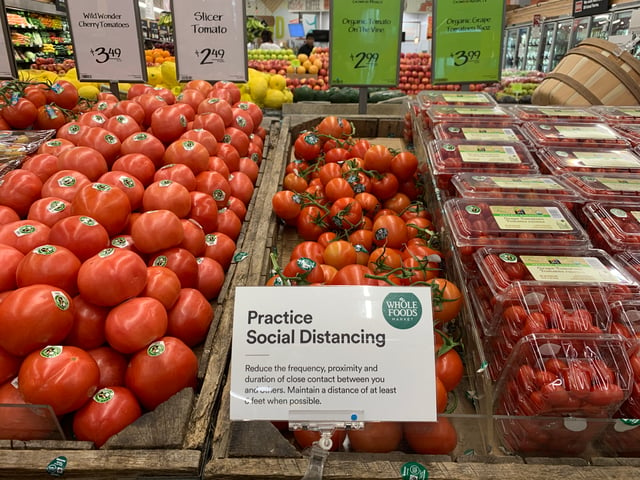Whole Foods to Give Shoppers Masks
Whole Foods Market is joining Costco, The Fresh Market and other grocers in encouraging or requiring shoppers to wear masks while shopping in-store.
Within the next week, Whole Foods Market says it will provide free, disposable masks to all customers when they arrive at stores nationwide, and encourage that they wear them while they shop. Last month, The Fresh Market started requiring shoppers to wear masks in-store. Last week, Costco announced it would require shoppers to wear masks, too. Only Whole Foods Market has said it would provide shoppers with free masks.
Last week Amazon announced it has provided more than 100 million masks to its global Amazon operations network and Whole Foods Market stores, making them available to all Amazon associates, delivery service partners, Amazon Flex participants, seasonal employees, and Whole Foods Market employees.
"We have enough mask inventory to cover our entire operations and stores network, and we are requiring everyone working in our facilities to take and use them," said an Amazon company statement.
In a first quarter earnings report late Thursday, Amazon said it would spent $4 billion or more in the second quarter on COVID-related costs. Amazon reported record online and physical store sales during the first quarter ended March 31.
Direct e-commerce sales, which Amazon calls "online store sales," were up 25%, a record for the company. That measure includes sales from customers who order goods online for delivery or pickup at physical stores. The record-setting jump in online store sales would seem to indicate a pandemic-related boost for Amazon from grocery delivery and pickup.
Meanwhile physical store sales (i.e., sales at Whole Foods Market) were up 8%, another record for the company (that measure had been flat or decelerating in previous quarters). Amazon says it is "working hard to increase order capacity for Prime Now, Amazon Fresh, and Whole Foods Market."
"We’ve expanded Whole Foods Market grocery pickup from roughly 80 stores to more than 150, adjusted store hours for select locations to focus exclusively on fulfilling online grocery orders during certain times, and have made it easier for customers to see when the next delivery window is available on the Prime Now, Amazon Fresh, and Whole Foods Market homepages."
Amazon has been struggling to keep up with grocery delivery and grocery pickup demand. In early April, the retailer put new grocery delivery and pickup customers for both Amazon Fresh and Whole Foods Market on a waitlist as available time slots have become nearly nonexistent in recent weeks.
Amazon has also implemented safety measures in Whole Foods Market stores, including providing plexiglass barriers between cashiers and customers at checkout, rolling out enhanced cleanliness and sanitation protocols, and enforcing social distancing guidelines. "Our Whole Foods Market locations are open to seniors one hour before opening the store to the general public, and we are reserving the first hour of grocery pickup at select Whole Foods Market locations for seniors."
In an earnings call, CFO Brian T. Olsavsky said the company is spending $300 million on virus testing as part of its $4 billion total COVID-19 expense. While overall demand is strong with consumers stuck at home, Olsavsky said the apparel, shoes and wireless product categories have lagged.
Under the Austin, Texas-based Whole Foods Market banner, Seattle-based Amazon is No. 10 on Progressive Grocer’s 2019 Super 50 list of the top grocers in the United States.











